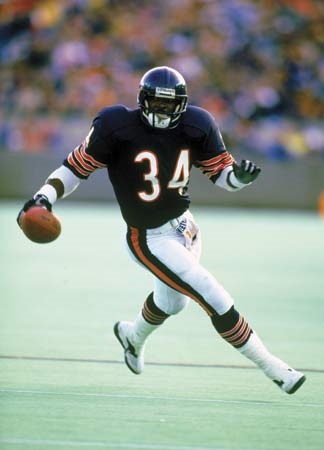 |
| (http://blackathlete.net/artman2/uploads/1/Walter_Payton.jpg) |
Walter Payton was a man among boys on and off of the field, whether it was running hard to shed a tackler or running his own charity for a good cause. Walter Payton once said, “Remember, tomorrow is promised to no one.” That is the way that Walter lived every day. He lived every day to the fullest ever since he was born. Lots of people have done great things, but Walter Payton is a step above the rest.
Walter was born in Columbia, Mississippi in 1954. He was the son of Peter and Alyne Payton. Walter was the youngest of three children, his brother Eddie who was a star on the football team and later went on to play in the NFL, and his sister Pamela. Walter shied away from football at first because his brother Eddie was already the established star of the team. “Instead Walter played the drums, a passion of his since he was a child, playing in various jazz rock groups” (“Payton, Walter (1954-1999).” Encyclopeida of World Biography). But Walter remained athletic; he joined the track team and he competed in the long jump. When his brother went off to college “Payton took up an offer from the high school coach to try out for the team, but only on the stipulation that he could remain in the band as well” (“Payton, Walter (1954-1999).” Encyclopeida of World Biography). Payton was an instant star. Earning all state honors and being named to the All-American team, Payton was unstoppable.
With Payton’s skill he should have been able to go to any college he wanted to; however, the Blacks in the south were still being segregated so not many of the big schools recruited Walter. Instead, “he decided to join his brother at Jackson State College (now Jackson State University), a historically black school to play football” ("Payton, Walter (1954-1999)." Newsmakers). Payton was an instant success on the field. Walter was an All-American and led the nation in scoring. Even more importantly, Payton was also a success in the classroom. “After only three-and-one-half years of school he enrolled in graduate level courses to prepare for a career in education for the deaf” (“Payton, Walter (1954-1999).” Newsmakers). After college Payton was drafted by the Chicago Bears in 1974.
Walter Payton was an instant starter for the Bears for most of the season, until an ankle injury sidelined him for the rest of the season. When Payton did return he would be a star in the NFL. However, the Bears would see very little success during the season until Mike Ditka came in as the head coach of the Bears in 1982. Afterwards, the Chicago Bears would go on to win the Super Bowl in 1985. Walter’s running style was so unique and special, he was nicknamed “Sweetness.” Payton won many awards and accolades such as the NFL’s Offensive Player of the Year and the NFL’s Most Valuable Player twice. But more importantly, Payton also won the respect of his coaches. Mike Ditka has been quoted as saying, “Walter Payton is the greatest player I’ve ever coached at any position period” (“Payton, Walter (1954-1999).” Encyclopedia of World Biography). Payton would retire at the end of the 1987 season. “He set NFL records for total career rushing yardage (16,726 yards), most combined career yards gained (rushing and pass receiving, 21,803 yards), most seasons with 1,000 or more yards rushing (10), most yards gained in a single game (275 yards), most games with 100 or more yards gained in a career (77), and most career touchdowns earned by rushing (110)” (Encyclopedia, Britannica). Beloved by many for his rushing ability, it was a sad day for football fans everywhere when Walter retired from the game.
 |
| (uniwatchblog.com) |
Payton was a man on and off the field. When Payton retired he had set every rushing record in the NFL. When he did retire his work was not over, he started the Walter and Connie Payton Charity Foundation, and he would donate to countless charities. Payton also volunteered as a basketball coach. All of his colleagues were astounded that he would cancel business in order to go to a practice or a game. But commitment and loyalty were very important to Walter and he never wanted to disappoint his players. Tragically, when Payton died, he was only forty-three years old. He had been diagnosed with a very rare liver disease, and he was on the waiting list for a new liver. Sadly, Walter died before he could ever get it. But even through his death, Payton was able to contribute to society. He was able to increase awareness of the need for organ donations. He never felt sorry for himself nor did he want his fame to give him special treatment while waiting for a new liver. Payton lived his life every day to the fullest. He lived as a man but he died as a legend, because as Walter liked to say, “Remember, tomorrow is promised to no one.”
Page created on 5/28/2010 12:00:00 AM
Last edited 5/28/2010 12:00:00 AM
